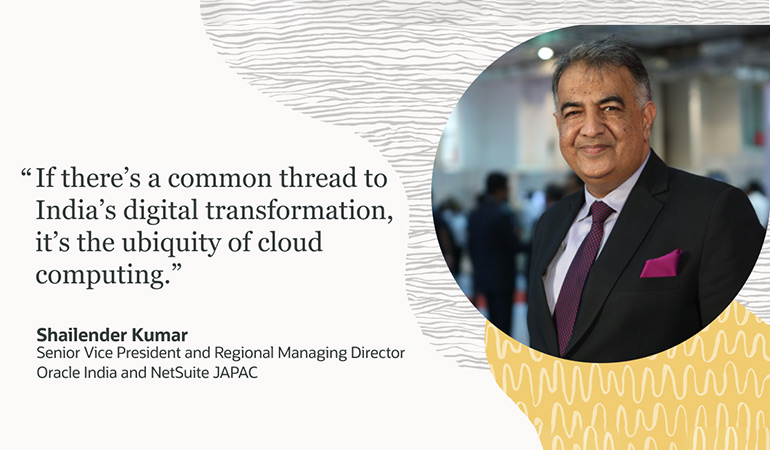
By Shailender Kumar
As we reflect on 75 years of Indian independence, we would be remiss if we didn’t acknowledge the national economic renaissance of the past two decades, made possible by the relentless technology-centric innovations of the country’s dynamic companies, visionary policymakers, and ambitious people.
India remains the fastest-growing major economy, expanding at a rate almost three times the world average and on track to become a US$5 trillion economy before the end of the decade. During a speech at a virtual business forum in June, Prime Minister Narendra Modi noted that the digital transformation driving much of that expansion is unprecedented on the world stage, predicting that the value of India’s digital economy alone will surpass US$1 trillion as early as 2025.
If anything, the COVID-19 pandemic accelerated India’s digitization. For example, in FY22, Universal Payments Interface (UPI) processed more than 46 billion transactions, breaching the US$1trillion mark, as consumers concerned about face-to-face transactions turned to e-payment methods. The target for UPI is to process a billion transactions a day in the next five years. We also saw the introduction of innovative digital health platforms, such as the open source CoWIN vaccination registration and monitoring system used by millions of citizens across India.
Why is India such fertile ground for such a digital proliferation? Among the favorable conditions are the country’s deep pool of technically educated professionals; its enterprising culture, now being liberated by more favourable regulations; its bold, government-supported digital programmes; its highly competitive domestic economy, fueled by an expanding middle class; and its fast-growing ecosystem of digital startups.
We used to hear about a lag in India when it came to adopting the latest technologies. No longer. Today, Indian businesses and consumers are at the forefront of tech invention, development, and adoption, whether it’s with 5G wireless, artificial intelligence, blockchain, high-performance computing, or other advanced technologies.
Vibrant Startup Ecosystem
Consider the country’s vibrant startup ecosystem, now the third largest in the world after the U.S. and China. The number of newly recognized startups In India, most of them digitally focused, increased to more than 14,000 in 2021-’22, from only 733 just five years ago, according to a report by the Department for Promotion of Industry and Internal Trade (DPIIT).
One promising startup, Bengaluru-based Aindra Systems, is using cloud-based high-performance computing to lower India’s staggeringly high death rate from cervical cancer. Another exciting startup, and a winner in a recent Startup Idol competition, is DeepVision Tech, a Bengaluru-based developer of an AI platform that enables easy two-way communication between speech- and hearing-impaired individuals who use sign language and those who don’t know it.
Of the more than 1,000 “unicorns” worldwide—pre-IPO companies valued at US$1 billion or more—74 are based in India, according to the latest list compiled by CB Insights. As recently as 2012, no unicorns were based in India.
Government Lends a Hand
At the center of the country’s economic renaissance are central, state, and local government agencies, whose aggressive digital initiatives coupled with a softer regulatory touch have created a framework for companies in all sectors to thrive. No central government programme is more comprehensive than Digital India, which is spreading high-speed digital infrastructure, digital government services, and digital literacy to even the most remote areas of the country.
Through initiatives such as Aspirational Districts Programme, the Indian government is embracing technology to improve people’s capacity to participate in the country’s economic development and help improve the quality of life of citizens in 112 of India’s most backward districts. Data-driven decisions, fully backed by technology, are helping identify the strengths and weaknesses of these districts and pave the way for their progress.
One other ambitious new government programme, supported by multiple technology players, including Oracle, is Open Network for Digital Commerce (ONDC), established by DPIIT to create open standards and thus lower the barriers to ecommerce market entry for retailers, grocers, travel agents, boutique hotels, and other small companies. Another initiative, called Secured Logistics Document Exchange (SLDE), aims to move the country’s federal ministries and state governments, as well as myriad industry players, toward a standardized digital transport and delivery infrastructure. The SLDE pilot service, developed by Hyderabad-based startup Cargo Exchange using cloud and blockchain technology promises to improve the security and transparency of import/export transactions in India, simplify and accelerate their execution, and lower their costs.
Meantime, Indian governments at all levels are trying to make it easier for companies to set up and transact business in the country, in part by lightening regulations on foreign direct investment, outsourcing, corporate borrowing, hiring, working from home, and other areas, while also making it easier for businesses and consumers to apply for permits and pay their taxes. In his recent remarks, Prime Minister Modi called out India’s “innovation-friendly” policies in areas such as space, blue economy, clean energy, drones, and geospatial data.
‘Can-Do Generation’
If there’s a common thread to India’s digital transformation, it’s the ubiquity of cloud computing, giving businesses of all sizes affordable, on-demand access to the very latest technology advances. All the major industry players now operate cloud data centers in India, including Oracle, out of Mumbai and Hyderabad.
But India’s extraordinary digital transformation is first and foremost a testament to its people: a rich matrix of high-achievers for whom change is a constant.
In remarks last year prefacing India’s celebration of 75 years of independence, Prime Minister Modi placed special emphasis on India’s young people, the most technically educated and intellectually curious individuals the country has ever groomed. The Prime Minister called them the “can-do generation,” one that is laying the digital foundation for generations to come.
Shailender Kumar is senior VP and regional managing director of Oracle India and NetSuite JAPAC.





















